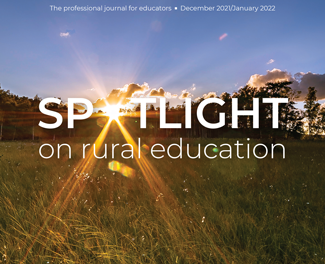The writing prompt from the presenter was simple enough: How has your race influenced your life?
I dutifully bent my head and put my pen to paper and . . . nothing. I had nothing to say. Race had not influenced my life. No experiences to reflect on. Nothing.
I sat up and looked across the room. Several other participants at that professional development session were staring blankly into the room. All of the non-writers were, like me, white. But every black or brown participant was writing furiously.
The discussion that followed was an emotional one that included some harrowing tales from black and brown participants about times when their skin color had become a subtle or a not-so-subtle factor in their lives. Nothing they said surprised me. The more disquieting comments came from white participants who, like me, had never seen how their race affected their day-to-day interactions or the general arc of their lives. The idea that our white skin had shaped our life experience was a new and uncomfortable notion.
I have never been able to look at the color of my skin in the same way again.
That singular experience was a watershed moment in which I learned that I cannot assume that my experience in life is shared by anyone who isn’t also white, female, affluent, healthy, straight, married, educated, and American.
That is an understanding that also leaves me feeling perpetually ignorant. Knowing that you don’t know something is both profoundly liberating and profoundly frightening. Acknowledging that I don’t understand something is freeing. But knowing that I don’t understand is also terrifying because it leaves me uncertain — as in, ignorant — about the gaps in my knowledge and experience.
Discomfort with race
I think about my race a lot these days. I am far more conscious of the color of my skin and especially how black and brown people might be reacting to me because of it. And I constantly check myself to learn whether someone else’s color may explain how I am reacting to them. I no longer assume that I am free of bias. I know that I am not, and instead I try to be aware of how those hidden beliefs shape my actions and my responses.
Why am I revealing this now? Because I believe that every change at an institution like a school has to begin with individual change. Since white educators make up the majority of the teachers and administrators in U.S. schools, we can accomplish little in the realm of changing beliefs about race until we change ourselves. And we cannot improve the education of children of color until we understand the complex interplay of the racial experiences we bring to school every day.
I am a novice in this arena. But our black and brown brethren have much to teach us about how to observe and consider race, and white educators would be wise to pause and listen to what they have to say. Reading their offerings in the pages of this issue of Kappan is an excellent place to start because they have honestly and generously proffered what they have learned from lives lived on one side of the racial divide.
When I consider how race has influenced my life and others, I often think of the story of the blind men and the elephant. Each blind man reaches out to touch a different part of the elephant. One reports that the elephant feels like a long hose because he has grabbed the trunk; another that the elephant feels like a rough, wrinkly face because he has touched the animal’s flank; still another that the elephant feels like smooth fabric because he has stroked the creature’s ear. All of them are right because where they stand and what they touch has given them a different perspective.
Only when we put all of our perspectives together will we get a full and rich picture of the communities in which we live, the schools in which we work, and the things that truly matter to all of our students.
JOAN RICHARDSON (@KappanJoan) is editor-in-chief of Kappan magazine.
Originally published in February 2017 Phi Delta Kappan 98 (5), 4. © 2017 Phi Delta Kappa International. All rights reserved.
ABOUT THE AUTHOR

Joan Richardson
JOAN RICHARDSON is the former director of the PDK Poll of the Public’s Attitudes Toward the Public Schools and the former editor-in-chief of Phi Delta Kappan magazine.











